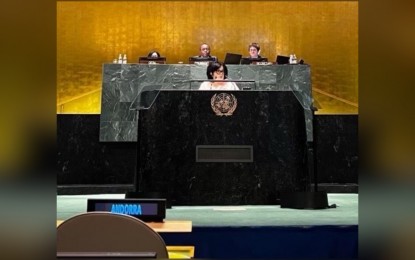
ADDRESSING WATER CRISIS. Environment Secretary Ma. Antonia Yulo-Loyzaga delivers her speech at the United Nations 2023 Water Conference held in New York on March 22 to 24. 2023. Loyzaga assured that the administration of President Ferdinand R. Marcos Jr. is proactively addressing the looming water crisis brought about by climate change. (PCO photo)
MANILA – Department of Environment and Natural Resources (DENR) Secretary Ma. Antonia Yulo-Loyzaga has assured the United Nations (UN) that the Philippine government is proactively addressing the looming water crisis brought about by climate change.
At the United Nations 2023 Water Conference held in New York on March 22 to 24, Loyzaga cited the measures being implemented by President Ferdinand R. Marcos Jr., together with the legislative branch and concerned government agencies, in meeting challenges, specifically the dwindling water supply, according to a press release issued on Tuesday.
“Today, more than ever, there is a critical need for nexus governance, climate and disaster resilience, one that pursues a strategic balance between supply and consumption of water for health, food, energy, and environmental security,” Loyzaga said.
She noted that among the directions being taken is the creation of a Water Resource Management Office (WRMO) under the DENR, a first in the country’s history, “to achieve water security by integrating the functions of all agencies with water-related mandates.”
The WRMO is aligned with new legislation, creating an apex body for comprehensive water resource management that will adopt an all-hazards and risk-informed integrated water resource management approach.
Loyzaga said achieving adequate and equitable access to safe drinking water and sanitation services is at the core of sustainable development.
“All the plans and programs of the government to provide universal access to safe, sufficient, affordable, and sustainable water supply, sanitation, and hygiene will be completed by 2030,” she said.
She added that an integrated water management approach also ensures that local government units’ water-related policies and actions are all aligned with the Philippine Development Plan.
“We are establishing the national geospatial database for natural resources, including water, in order to achieve cross-cutting development goals, de-risked investments, and improve the water resource management down to the community level. It underpins our natural capital accounting programs and establishes the physical bases of the design of water-related social and infrastructure programs, which aim to ensure that no ecosystem or community is left behind,” Loyzaga explained.
With an average of 20 typhoons entering the country each year, bringing torrential rains and flooding that cause waterborne diseases, the Philippines currently ranks fourth among the countries in the world most affected by water-related disasters.
“Extreme rainfall events and prolonged periods of drought have impacted our food and energy supply. Between 2010 and 2019, damages incurred due to floods, droughts, and storms have amounted to USD10 billion,” Loyzaga said. “Water stress and insecurity remain and disasters do move people into poverty. We are not alone. Climate-vulnerable developing countries are faced with similar crises.”
The DENR chief also shared the country’s best practices that stem from the government commitments to address the urgency of the link between climate change and water, health, food, energy, and environmental security, as embodied in the Philippine Development Plan.
The Marcos administration, she said, is geared towards three major policy directions: the establishment of the WRMO under the DENR and related legislative initiatives; the building of the National Natural Geospatial Database, with water as a layer, in support of the natural capital accounting system; and advancing the Philippine Health Facility Development Plan 2020-2040, especially giving priority access to water, sanitation, and hygiene or WASH in public health care facilities.
Citing the Philippines as an example of good practice, a side event on WASH was also held, co-organized by Hungary and the Philippines, and moderated by the World Health Organization.
The Philippines’ participation in the UN 2023 Water Conference is critical because it was the first time that the UN member states expressed that water, climate change, biodiversity, disaster risk, and human development are inextricably linked.
It was also the first time since 1977 that this conference was held.
Aside from the DENR, the Philippine delegation consisted of members of the Permanent Mission to the UN, the National Economic and Development Authority, the Department of Health, the Department of Budget and Management, the Department of Finance, Manila Waterworks and Sewerage System, and Local Water Utilities Administration.
In a related statement, Senate President Pro-Tempore Loren Legarda urged the government and private sector to help reduce greenhouse gas (GHG) emission.
"The science is clear that we have to act with much more urgency than before. I urge all leaders in government and the private sector: We have to ensure that our vulnerable communities and natural ecosystems are able to adapt to the climate crisis, and we have to stop relying on fossil fuels. Let's heed the call for rapid emissions reduction and enable a resilient future for all," Legarda said on Tuesday, following the release of the latest Synthesis Report of the Intergovernmental Panel on Climate Change (IPCC).
The IPCC reports are reviewed by climate experts from 195 member-states and provide political leaders with periodic scientific assessments about climate change.
The reports showed that climate change is causing widespread and rapid changes, leading to deadly floods, destructive storms, and raging fires and undermining public health, food security, and water supply
She noted that the IPCC report, while alarming, also said that keeping global warming to the agreed threshold of 1.5 degrees Celsius in the Paris Agreement, the treaty on climate change adopted in 2015, is still entirely possible and that the solution lies in climate resilient development.
Legarda suggested the deployment of renewable energy, low-emission technologies, and clean transport solutions -- all of which reduce or avoid GHG emissions and provide benefits for people's health, such as better air quality. (With a report from Leonel Abasola/PNA)
